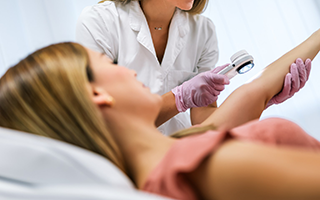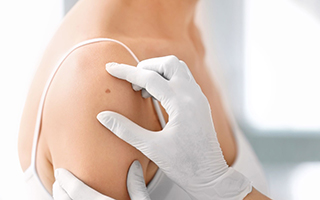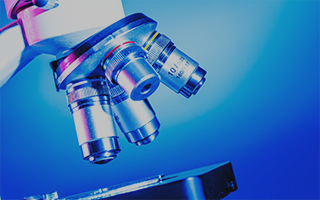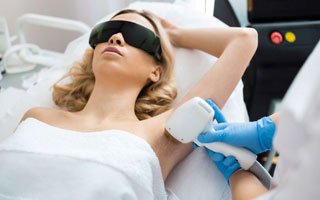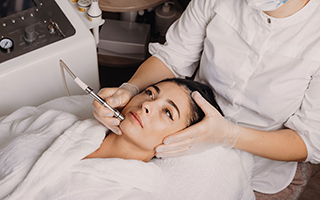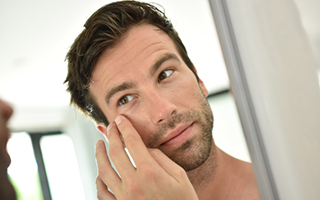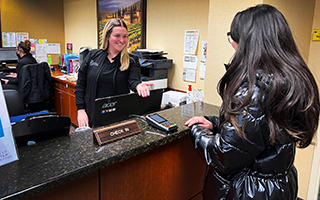Cold Sores
Manage Painful Fever Blisters for Bryn Mawr, Newtown Square, Philadelphia, and the Main Line
Cold sores, also referred to as fever blisters, are caused by the highly contagious herpes simplex virus. Although they aren’t considered to be a serious condition and routinely clear up on their own, they can be painful during an active flare-up. In patients who have a compromised immune system, the infection can be very serious. While there is no cure for cold sores, Bryn Mawr Skin & Cancer Institute offers diagnosis and treatments that can help prevent recurrences and reduce symptoms.
Bryn Mawr Skin & Cancer Institute provides advanced treatments for common dermatological conditions such as cold sores. Please BOOK ONLINE, call 610.525.5028, or Contact Us to schedule an appointment.
What Causes Cold Sores?
Specific types of the herpes simplex virus (HSV) cause this condition. There is no cure for the virus, and once you’ve contracted it, you always have it in your system—though you may be asymptomatic. The virus spreads from direct contact with other people or objects.
Some of the known triggers for flare-ups include sun exposure, stress, fever, colds or other viral infections, allergies, fatigue, dental work, cosmetic surgery, injuries to the skin, immune system changes, certain foods, and hormonal changes that are related to menstruation.
What Are the Symptoms of Cold Sores?
Fever blisters occur in stages, and it may take days for symptoms to begin after someone is infected. Patients typically experience itching, burning, and tingling around the lips prior to blister formation. These small, raised, fluid-filled blisters usually erupt around the mouth or lips, or on the nose or cheeks, though they can affect any part of the face, depending on where the virus has entered the body.
Cold sores usually appear as a group of blisters. The skin beneath them becomes red, swollen, and painful. Eventually, the blisters flatten as the fluid is released. This oozing and crusting stage lasts for several days. Finally, the blisters crust over and the involved skin may be itchy. Untreated cold sores tend to heal within two weeks.
Patients may also have symptoms such as fever, muscle aches, sore throat, headache, red or swollen gums, and swollen lymph nodes with the first outbreak. These symptoms are greatly reduced or absent with subsequent episodes.
Who Is at Risk for Cold Sores?
Anyone can get cold sores. Many adults carry the virus, even if outbreaks don’t ever occur. However, people with weakened immune systems due to certain chronic conditions or specific medical treatments stand a greater risk of developing severe complications. These immunocompromising conditions include HIV/AIDS, atopic dermatitis (eczema), cancer chemotherapy, and anti-rejection drugs for organ transplants
Treatment Options for Cold Sores
Topical creams can be purchased at a pharmacy to relieve the discomfort of cold sores and help them to heal more quickly. You can also apply ice or take over-the-counter anti-inflammatory medications, such as Ibuprofen, to ease the discomfort.
Although you can treat this condition on your own with at-home remedies, you should see a doctor if you have a weakened immune system, the cold sores aren’t healing after several weeks, symptoms have become severe, outbreaks are occurring frequently, or your eyelids or inside of your eyes are affected. Once a dermatologist has diagnosed cold sores, anti-viral medications and creams can be prescribed to reduce symptoms and the risk of future breakouts.

Meet Our Dermatologists &
Certified Physician Assistants
Our board-certified dermatologists & PA-Cs are dedicated to detecting and treating skin cancers. We treat the full spectrum of skin diseases. Our Mohs and Plastic Surgery practices are integrated, and offer patients the most advanced skin cancer treatment, delivering superior outcomes.
How Can You Prevent Cold Sores?
Aside from taking prophylactic anti-viral medications, you can prevent cold sores by avoiding behaviors or conditions that trigger them. Apply broad-spectrum SPF 50 sunscreen and use a lip balm that contains SPF all year round, get plenty of sleep to strengthen your immune system, avoid kissing or other forms of skin contact with others when you have cold sores, don’t share personal items, and keep your hands clean during an outbreak. Refrain from touching the site of an active flare.
What Other Skin Conditions Can Be Treated?
The Bryn Mawr Skin & Cancer Institute team is experienced in diagnosing and addressing many dermatological conditions that cause bumps, sores, redness, itching, and discomfort. We treat general rashes, poison ivy, folliculitis, and hives. Our dermatologists are ready to identify the cause of your problem and help manage symptoms.
For more information on treating cold sores in Bryn Mawr, Newtown Square, and Philadelphia, contact Bryn Mawr Skin & Cancer Institute. To schedule an appointment, Please BOOK ONLINE, call 610.525.5028, or Contact Us.




